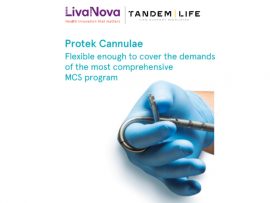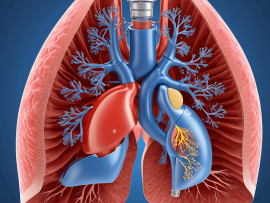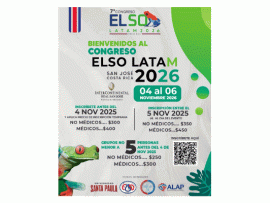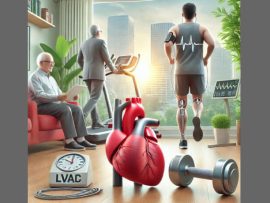Abstract Objective To evaluate the effectiveness of venovenous (VV) extracorporeal membrane oxygenation (ECMO) using a dual-lumen cannula coupled with continuous mechanical chest compressions (cMCC) for cardiopulmonary resuscitation and compare it..
Read MoreAbstract Background Despite sternum sparing and without cardiopulmonary bypass, the actual value of minimally invasive coronary surgery (MICS) is still debatable. This study aimed to compare the completeness of revascularization..
Read MoreAbstract Background To evaluate the effect and safety of modified ultrafiltration warming technology during pediatric congenital heart disease (CHD) surgery. Methods A retrospective analysis included 68 children (<1 year) who..
Read MoreAbstract Background Acute kidney injury (AKI) and dysnatremia following pediatric cardiac surgery are common conditions associated with worse outcomes. While the multifactorial etiology of AKI is well-known, the role of..
Read MoreAbstract Objective To discuss technical strategies and considerations to facilitate intraoperative extracorporeal membrane oxygenation (ECMO) management during lung transplantation. Methods We review our institutional approach to the management of intraoperative..
Read MoreAbstract Introduction Standard “yes/no”' checklists fail to meet their purported goals of enhancing patient safety because they enable inattentive completion and complacency. The mere presence of a check mark is..
Read MoreAbstract Introduction The increasing integration of Artificial Intelligence (AI) and Virtual Reality (VR) in healthcare education offers innovative ways to enhance collaborative learning and improve patient safety. This narrative review..
Read MoreAbstract Background Extracorporeal cardiopulmonary resuscitation (ECPR) can improve outcomes in refractory out-of-hospital cardiac arrest (OHCA), but access is limited by geographic and system constraints. We aimed to compare the potential..
Read MoreAbstract Background While the clinical effectiveness of extracorporeal cardiopulmonary resuscitation (ECPR) for out-of-hospital cardiac arrest (OHCA) has gained increasing attention, its real-world utilization, patient selection, and system-level implementation remain incompletely..
Read MoreAbstract Mixed shock has been identified by the Shock Academic Research Consortium (SHARC) as a “high-risk, understudied population”. It develops in around one-quarter of patients with cardiogenic shock and has a higher..
Read MoreAbstract Extracorporeal life support (ECLS) requires specialized cannulas for vascular access that are dependent on each patient’s needs, size, and unique vascular anatomy. There are currently no commercially available drainage..
Read MoreAbstract Objectives To describe outcomes in patients who received venoarterial extracorporeal membrane oxygenation (VA-ECMO) for cardiogenic shock and to evaluate outcomes following programmatic changes. Design A retrospective cohort study. Setting..
Read MoreAbstract Post cardiac surgery shock (PCS) is a life-threatening condition that may require the use of mechanical circulatory support. Venoarterial (VA) extracorporeal membrane oxygenation (ECMO) is increasingly used to treat..
Read MoreAbstract Background Mixed cardiogenic and septic shock has been shown to have a higher mortality than cardiogenic shock alone and presents a unique hemodynamic phenotype. Objectives This study aimed to..
Read MoreAbstract Objectives: Extracorporeal membrane oxygenation (ECMO) is a critical intervention for patients with severe cardiac or respiratory failure. However, pharmacological management for ECMO-supported patients presents unique challenges due to alterations..
Read MoreAbstract Veno-venous extracorporeal membrane oxygenation (V-V ECMO) is a life support technique used for patients with life-threatening respiratory failure. It effectively addresses arterial hypoxemia without overstretching the injured lungs. Traditional..
Read MoreAbstract The use of Extracorporeal Cardiopulmonary Resuscitation (ECPR) in cases of cardiac arrest is increasing, as addressed in the number of cases in the Extracorporeal Life Support Organization (ELSO) dashboard. Of..
Read MoreAbstract Background Veno‑venous extracorporeal membrane oxygenation (VV‑ECMO) is associated with a high transfusion burden. While trials have concluded that red blood cell (RBC) storage does not impact patient morbidity and..
Read MoreAbstract The Working Group on Cardiopulmonary Bypass and Extracorporeal Life Support of China National Center for Cardiovascular Quality Improvement presents evidence-based guidelines on patient blood management for adult cardiac surgery..
Read MoreAbstract Background Autologous blood donation (ABD) can be indicated in pregnant individuals with rare blood groups. Yet, unlike hospitals, some blood establishments are reluctant to collect ABDs in this population...
Read MoreAbstract Background Vasoplegia during cardiac surgery is common and associated with perioperative mortality. Hydroxocobalamin is a catecholamine-sparing approach for treating vasoplegia. However, there is currently limited evidence to inform its..
Read MoreAbstract Background The global prevalence of congenital heart disease (CHD) is increasing. Research on patient-reported outcomes (PROs) predominantly originates from high-income countries, resulting in an incomplete understanding of the true global..
Read MoreAbstract Background During cardiopulmonary bypass (CPB), which is frequently utilized in open-heart surgery, the maintenance of circulation in a non-physiological environment may lead to alterations in the properties of circulating..
Read MoreAbstract Sleep is essential for human health and represents an active state of unconsciousness that plays a critical role in restoring brain and body functions, as well as regulating the..
Read MoreAbstract Background Thrombocytopenia is a recognized risk factor for bleeding during extracorporeal membrane oxygenation (ECMO). This study determines the incidence, risk factors, and clinical relevance of thrombocytopenia and platelet transfusions..
Read MoreAbstract Extracorporeal Life Support (ECLS), including venovenous (VV) extracorporeal membrane oxygenation (ECMO) and extracorporeal carbon dioxide removal (ECCO2R) is a temporary support option for patients with severe respiratory failure. Current..
Read MoreAbstract Background: Cardiac surgery with cardiopulmonary bypass (CPB) is associated with impaired renal oxygenation and acute kidney injury. We investigated whether a higher than our standard blood flow during CPB..
Read MoreAbstract Many of the pivotal early achievements in cardiac surgery were possible because of research using canine models. Specific advances attributed to canine experiments include the use of hypothermia, cardiopulmonary..
Read MoreAbstract Cerebral embolic protection (CEP) devices may be a tool to mitigate the perioperative stroke risk in cardiac surgery. However, studies are limited. The aim of this study was to..
Read More





















